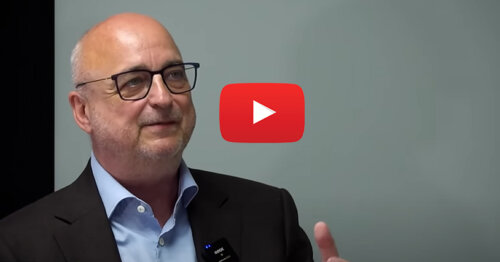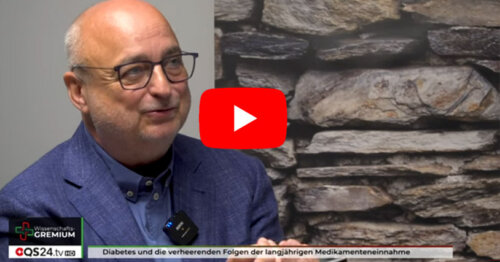DIAKARD ReNew therapy
Innovative treatment for the regeneration of insulin production

Introduction to DIAKARD ReNew therapy
Prof. Dr. Dr. Andreas Pfützner and the Pfützner Science & Health Institute (PSHI Praxis GmbH with affiliated private practice) in Mainz have developed ReNew, a promising therapy for the treatment of early type 2 diabetes mellitus.
read more
ReNew therapy aims to regenerate and stabilize insulin production in the beta cells of the pancreas in the long term. By using specific biomarkers, individual diabetes phenotypes can be precisely determined and tailored treatment strategies developed. With the targeted use of medication and lifestyle changes for a temporary time frame, it is often possible to optimally control diabetes for several years sometimes even without drugs.
"
In 30 years of diabetes research, we have succeeded in identifying three biomarkers that help us to better understand the nature and severity of the basic disorders of diabetes.
Who can benefit from this therapy?
ReNew therapy is particularly suitable for patients with type 2 diabetes in whom the beta cells of the pancreas are still functional and the production capacity is not yet severely restricted.
read more
It is particularly beneficial for people with insulin resistance, obesity or those who want to avoid long-term insulin treatment. The therapy is customized based on biomarkers and health parameters. It is suitable for patients whose health is stable and who have no serious concomitant diseases such as kidney or heart disease.
The therapy is not suitable for people with advanced diabetes and severely impaired beta-cell function.
How does it work?
The ReNew therapy addresses where the main causes of type 2 diabetes. Instead of focusing solely on controlling blood sugar, it aims to achieve a sustainable improvement in the body’s own insulin production and utilization.
read more
Through targeted treatment of the specific basic disorders of diabetes – such as insulin resistance, impaired beta cell function and inflammatory processes – the therapy enables partial regeneration of the pancreas. With the help of an individually adapted combination of medication and lifestyle interventions, the therapy thus creates the conditions for long-term remission, which may well enable patients to manage their disease without medication for years and live a healthier life.
Specifically, the therapy achieves the following:
Regeneration of the beta cells:
The therapy supports the regeneration of the insulin-producing beta cells in the pancreas. As a result, natural insulin production can be restored and stabilized.
Improvement of insulin sensitivity:
Targeted treatment of insulin resistance improves the uptake of glucose in muscle and fat cells, which leads to a reduction in blood sugar levels.
Relief of the pancreas:
Prescribing insulin in low doses reduces the load on the pancreas and allows it to produce insulin more effectively.
Reduction of hormone secretion from visceral adipose tissue:
The therapy aims to reduce metabolism in visceral adipose tissue, which leads to a reduction in lipid metabolism disorders and inflammatory processes.
Lowering blood sugar and improving weight regulation: The combination of exercise, diet and medication stabilizes blood sugar and supports healthy weight loss, which counteracts diabetes-related complications.
Reduction of systemic inflammation:
The therapy combats chronic systemic inflammation and thus reduces the risk of cardiovascular disease and atherosclerosis.
Possibility of remission without permanent medication:
If the therapy is successful, a long-term remission phase can be achieved in which blood sugar remains controlled without continuous medication.
Which side effects can occur?
ReNew therapy for the treatment of early type 2 diabetes involves the use of various drugs approved for diabetes therapy, which can potentially have side effects.
read more
However, these are therefore individually dosed and carefully monitored to minimize risks.
Possible side effects of ReNew therapy:
Drop in blood pressure and blood sugar:
As the therapy aims to stabilize blood sugar, there may be a temporary drop in blood sugar levels or even blood pressure, particularly at the start of treatment. This is caused by the accompanying measures such as the administration of insulin and other medications. In very rare cases, hypoglycemia may occur, but this is usually avoided by using low doses of insulin and regular glucose monitoring.
Gastrointestinal discomfort:
Some of the medications, such as GLP-1 agonists or SGLT2 inhibitors, can cause gastrointestinal symptoms such as nausea, vomiting or diarrhea. These symptoms are usually temporary and disappear after a certain adjustment period.
Weight loss:
The reduction of visceral fat tissue and weight regulation as part of the therapy can lead to unwanted weight loss, which may need to be monitored in some cases.
Increased risk of urinary tract infections:
There is a slightly increased risk of urinary tract infections when using SGLT2 inhibitors, as these drugs promote glucose excretion via the urine.
Water retention in the body (edema):
In some cases, certain medications (e.g. glitazones) can cause water retention in the tissues, which can manifest itself in the form of swelling.
Renal function:
SGLT2 inhibitors can impair kidney function, which is why regular checks of kidney values are necessary.
Muscle or joint pain:
Some patients may experience muscle pain or joint discomfort during therapy with certain medications (such as glitazones).
Overall, it can be said that the side effects of ReNew therapy are generally well controllable, as the medication is individually adjusted and the patient’s therapy is regularly monitored. The risk of serious side effects is kept low through the targeted selection of medication and its low dosage. However, it is crucial that patients work closely with their physician to identify potential side effects at an early stage and adjust their therapy accordingly.
How is the treatment conducted?
ReNew therapy is carried out in several phases in order to achieve a regeneration of insulin production.
read more
At the beginning, an individual analysis of the patient is carried out based on various biomarkers that determine the specific type of diabetes and the severity of the disease. A customized treatment plan is then drawn up on this basis.
The more detailed process
Treatment phase:
In the first phase, which lasts around three months, the patient receives a combination of medications that specifically treat the basic causes of type 2 diabetes. These medications act on insulin resistance, visceral fat tissue and support insulin production. The dosage is adjusted so that hypoglycemia cannot occur.
Recovery phase of the beta cells:
Therapy relieves stress on the pancreatic beta cells, allowing them to regain function and, in some cases, creating new beta cells.
Review and adjustment:
After three months, the medication is discontinued and the biomarkers are checked again. Based on the results, a decision is made as to whether the therapy should be continued or adjusted. In many cases, patients can then continue without medication in the long term and control their diabetes with lifestyle changes alone.
The entire therapy is closely monitored in order to achieve the best possible results. If necessary, the therapy can be repeated, i.e. in the event that the diabetes recurs.
Do I have to come to Mainz for this?
For ReNew therapy, a visit to the private practice of Prof. Dr. Dr. Pfützner in Mainz is recommended. In Switzerland, we work together with the Swiss Mountain Clinic in Castaneda (www.swissmountainclinic.com) for ReNew therapy.
read more
The therapy is based on a comprehensive, individual analysis of the metabolic profile, which is carried out on site. Specific biomarkers are analysed at the institute to determine the individual type 2 diabetes phenotype and serve as the basis for the personalized treatment strategy.
After the initial examination and treatment planning, however, not all follow-up appointments are necessarily required on site. Further care and follow-up can also be carried out in consultation with the family doctor, so that repeated visits to Mainz may not always be necessary.
What is the difference to conventional therapy?
In contrast to conventional therapy, which often involves a continuous increase in medication and ultimately insulin therapy, ReNew therapy focuses on regenerating the pancreas’ insulin production and treating the underlying causes of diabetes.
read more
The aim is to achieve remission, where many patients can manage without medication for years.
ReNew therapy represents a promising approach to treating early type 2 diabetes by focusing on restoring insulin production in the beta cells of the pancreas. By identifying individual biomarkers, our physicians can target the specific underlying disorders of diabetes. The therapy combines drug interventions with lifestyle-oriented measures to not only regulate blood glucose levels, but also to promote sustained remission. Many patients experience significant improvements in their quality of life and can often manage without medication in the long term. This offers a promising alternative to conventional therapies and has the potential to significantly improve the well-being of people with type 2 diabetes.
Conclusion of the DIAKARD ReNew therapy
Many patients experience significant improvements and can often manage without medication in the long term.
This offers a promising alternative to conventional therapies and shows the potential to significantly improve the quality of life of people with type 2 diabetes.
Video about DIAKARD ReNew therapy
Case study from our practice
Flight ban due to insulin?
The case of a pilot with type 2 diabetes
Case study ReNew
A pilot has been living with type 2 diabetes for four years and is currently being treated with metformin and glimepiride.
His HbA1c is 7.3% and his BMI is 26.4 kg/m². Due to his metabolic situation, the aviation medical service is planning to introduce basal insulin therapy. However, this measure would have serious professional consequences, as it would result in a ban on flying.
We are happy to support you!
Visit us and experience how state-of-the-art diabetology care and a pleasant practice atmosphere go hand in hand. We look forward to welcoming you and providing you with first-class medical care – with a smile!

